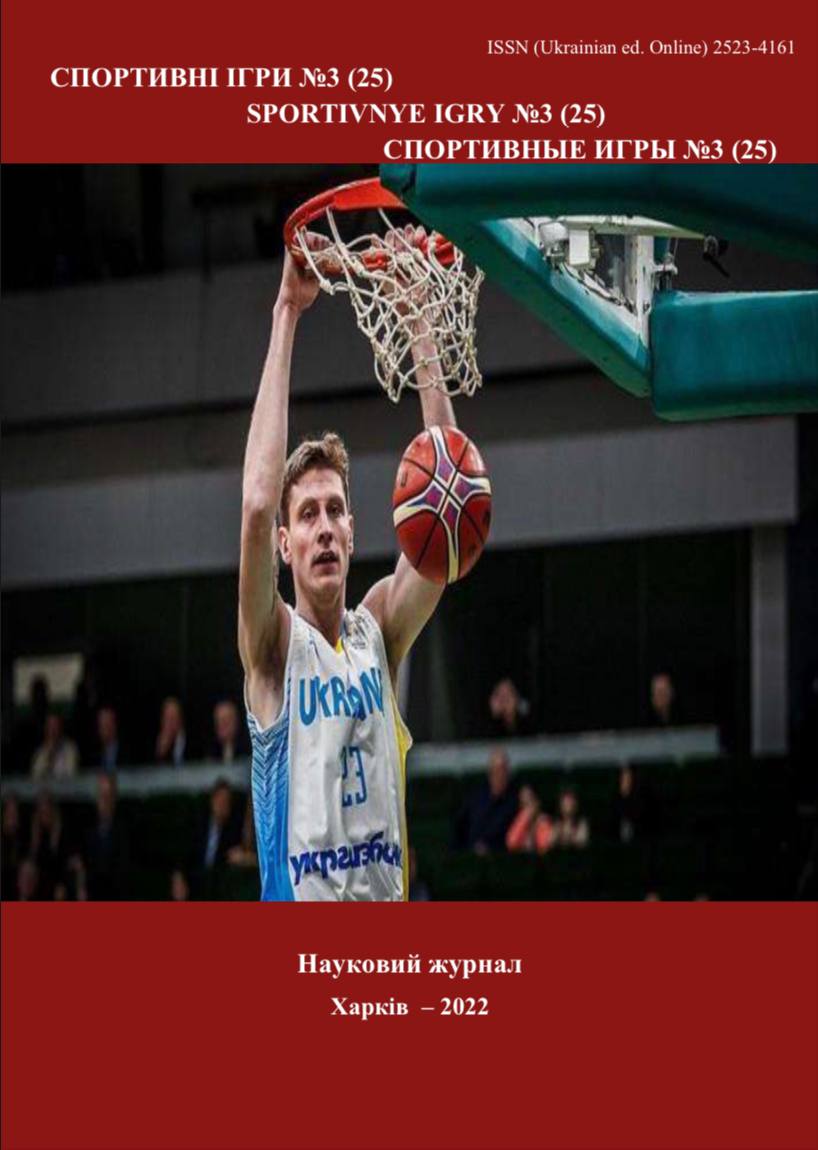Emotional state of the young volleyball player: Dynamics of changes in the process of sports and training activity
DOI:
https://doi.org/10.15391/si.2022-3.02Keywords:
young athlete, volleyball, emotional states, sports and training activitiesAbstract
One of the urgent problems in
modern sports is the study of the emotional states of athletes, including young ones. This is due to
the constantly changing socio-economic conditions that have affected sports activities. Increased
workloads, high competition lead to a high level of stress and an increase in emotional stress.
Emotions show the state of the athlete and his attitude to a particular sporting situation. The article
reveals the theoretical and practical aspects of the problem of the emotional states of athletes.
Emotional states are a set of psychophysiological phenomena, where, in addition to motor
reactions, there are various changes in the course of processes that are associated with different
manifestations of emotions. They differ in individuality, polarity, variability, wholeness. The
purpose of the study is to identify the degree of dynamics of changes in the emotional state of
young volleyball players in the process of sports and training activities. Material and research
methods. In the study described in the article, the following methods were used: theoretical:
analysis of literary sources on the problem under study; observational – psychological and
pedagogical observation of the dynamics of the emotional state of young volleyball players;
diagnostic: ascertaining and forming experiments, statistical methods. To study the characteristics
of emotional states, the following psychological questionnaires were used: "Drawing test – tree –
self-portrait – terrain" DAM, "Health, activity, mood" SAN. The study sample consisted of 29
athletes aged 13-14 years (boys n=15, girls n=14). The study was conducted on the basis of the KZ
"Poltava SDYUSSHOR No. 2". Results of the study: the study revealed that, in general, young
athletes are dominated by emotional comfort, positive emotional states, the desire to practice the
skills of the game attentively and with the manifestation of a cognitive need, good health, mood,
steady interest and concentration in the implementation of a sports game, full inclusion in training
process. Conclusions: emotional state - a set of psychophysiological phenomena, where, in
addition to motor reactions, there are various changes in the course of processes associated with
various manifestations of emotions. During the study of the emotional state of young athletes, all
the studied indicators of both the experimental (p≤0.001) and control (p≥0.05) groups changed
positively. The reliability of differences in the dynamics of emotional indicators is confirmed by the
results of the paired Student’s t-test. The study of the emotional state of young athletes at the final
stage of the study revealed significant positive changes in almost all indicators of the emotional
state of children.
References
Бріскін, Ю.А., & Пітин, М.П. (2011). Проблема диференціації техніко-тактичної підготовки спортсменів в ігрових командних видах спорту. Вісник Запорізького національного університету, 1(5), 143-151.
Вилюнас, В.К. (2004). Психология эмоций. СПб.: Питер.
Горская, Г.Б. (2012). Организационный стресс в спорте: источники, специфика проявлений, направления исследований. Физическая культура, спорт – наука и практика, 4, 74-76.
Гоулман, Д. (2009). Эмоциональный интеллект; [пер. с англ. А.П. Исаевой]. М.: АСТ; Владимир: ВКТ.
Зюкин, А.В., & Набойченко, Е.С., & Носкова, М.В. (2019). Психолого-педагогические технологии формирования высокой психической устойчивости у действующих спортсменов. Уральский медицинский журнал. 1(169). 98-105.
Изард, К.Э. (2012). Психология эмоций. СПб.: Питер.
Ильин, Е.П. (2001). Эмоции и чувства. СПб.: Издательство Питер.
Илясова, Н.В., & Агавелян, Р.О. (2014). Особенности эмоционального интеллекта спортсменов индивидуальных и командных видов спорта. Проблемы современной науки и образования, 11 (29), 105-108.
Кошура, А.В. (2021). Теорія і методика спортивних тренувань: навч. посіб. Чернівці: Чернівец. нац. ун-тім. Ю.Федьковича.
Мачушник, О.Л. (2012). Загальна психологія. Тестові завдання: Навчально-методичний посібник. Житомир: ЖДУ імені Івана Франка.
Санникова, О.П. (1995). Эмоциональность в структуре личности. Одесса: Хорс.
Чебикін, О.Я., & Павлова, І.Г. (2009). Становлення емоційної зрілості особистості: монографія. Півд. Наук. центр АПН України. Одеса: СВД Черкасов.
Чернявська, Т.П. (2022). Емоційний інтелект як ресурс конкурентоспроможності у спортивній ігровій діяльності. Спортивні ігри, 2(24), 82-90. doi: 10.15391/si.2022-2.9
Bar-On R. The Bar-On (2004). Emotional Quotient Inventory (EQ-i): Rationale, description, and summary of psychometric properties. Measuring emotional intelligence: Common ground and controversy. New York: Nova Science Publishers. 42-111.
Jeff Gallimore Dr. Stephen Burke (2005). Athletic burnout. Sport Exercise Psychology. Australian Catholic University. School of Human Movement (NSW). Sydney, Australia, 41-52













